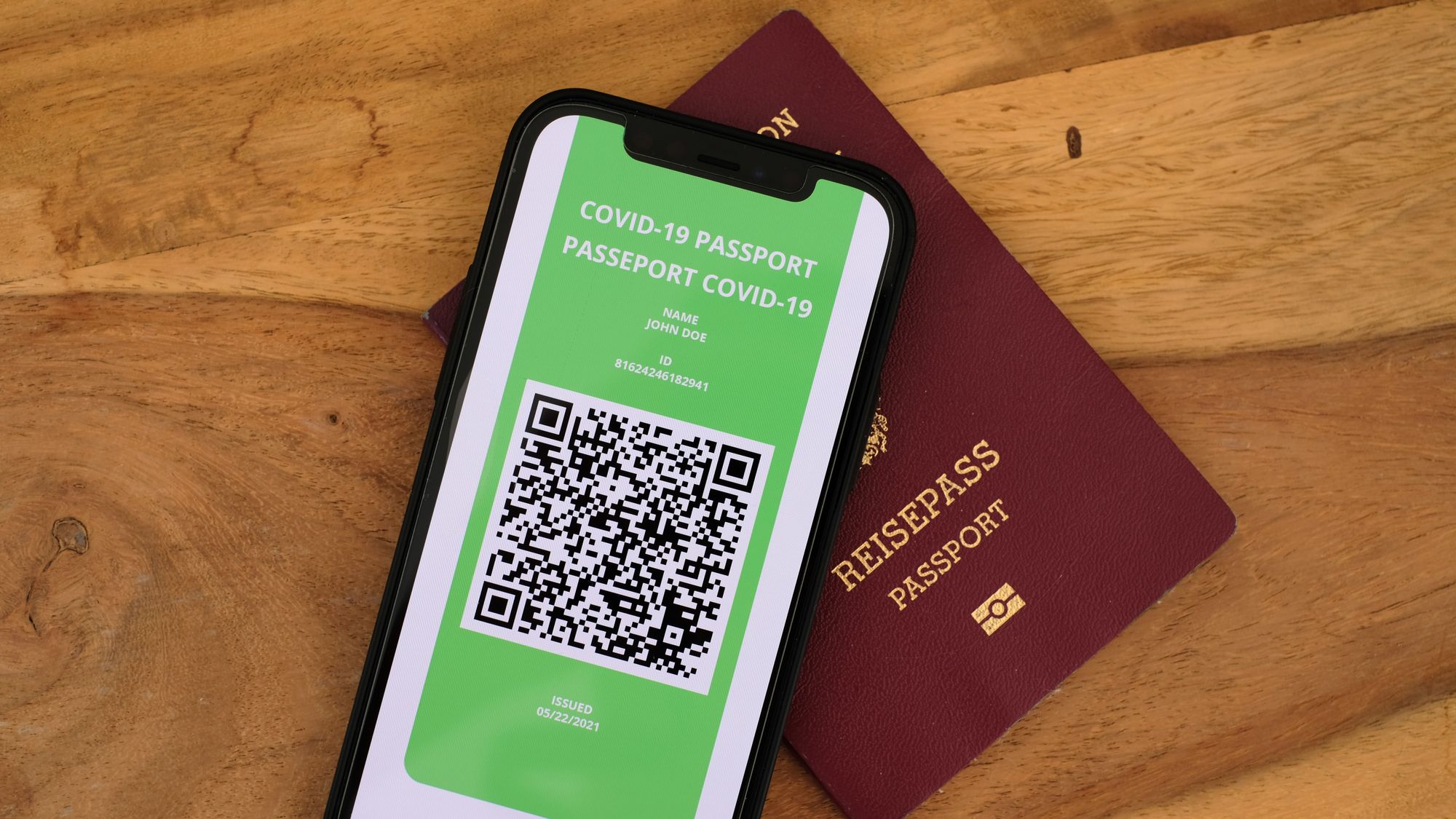Is the 'voluntary' use of vaccine certification a softer answer to mandatory vaccination? Given the legal and ethical concerns around mandatory vaccination, there has been much interest in what looks like a softer approach, namely making certain freedoms and privileges (e.g., air travel, dining in restaurants, exercising in gyms, or employment in certain areas) conditional on displaying a vaccination passport or certificate. Before vaccines were available, there was talk, in some countries, of issuing immunity passports to those who had acquired natural antibodies to the disease. This proposal was controversial, inasmuch as it would incentivize people to actively seek infection in order to develop immunities. It appears that this specific concern has been somewhat alleviated with the availability of vaccines: in Israel, for example, ‘green passes’ are issued both to those who have been vaccinated and those who have acquired natural immunity. The same approach has been proposed by the EU, as will be outlined below.
Whether vaccination passports represent a more equitable and less-coercive alternative to mandatory vaccination will depend on how the passports are used, and other contextual factors. There is a worry, for example, that vaccination passports will further ingrain existing inequities in access to vaccines and in the burdens of Covid-19 generally. Our survey finds that at least two countries - India and Colombia - have explicitly refused to accept vaccination passports until inequities in access to vaccines are addressed; the Indian Medical Association has urged the Indian government to implement vaccination passports promptly once access issues are resolved. There is also concern that the 'privileges' denied to the unvaccinated may verge on essentials, e.g. blocking access to employment, visiting loved ones in care.
A crucial mitigating step is to ensure that vaccinations are universally available, and promoted and distributed in a manner that addresses the specific needs and concerns of vulnerable populations. Furthermore, there will be some who cannot be vaccinated, whether due to age, or medical condition, or religious objection. One solution here is to allow alternatives - e.g., permitting individuals to furnish a recent negative test result in lieu of a passport. Another is to prohibit passport requirements for access to essential goods and services.
Vaccine passports, de jure, de facto
Most countries are still considering whether to implement a vaccination passport regime, along with regulatory options. Of the countries surveyed, only few have introduced regulations to date. Israel has been at the forefront, issuing digital ‘green passes’ to those who have been vaccinated or who have acquired natural immunity, which allow access to leisure, sports and cultural activities. In some settings (e.g. hotels), unvaccinated individuals can gain access by providing a recent (48 hours) negative test result. While the use of green passports is currently limited, there is concern that their use will be dramatically broadened – whether by de jure or de facto means. Austria has drafted, but not yet enacted, legislation which will require equal treatment for persons who hold passports, or have acquired natural immunity, or have a negative test result (48-72 hours). In China, according to our survey and developed further in a symposium contribution by June Wang, a QR code document issued after vaccination has come to serve as a de facto vaccination passport. Russia and Pakistan, and the province of Ontario in Canada, have issued or are planning to issue similar documentation, though there is scant information on their intended uses and regulation. In some countries, vaccination passports are accepted in very limited circumstances: for example, a decision by Lebanon’s Ministry of Health allows incoming travellers to bypass testing requirements by providing certification of vaccination. In the United States, three states have issued executive orders curtailing the use of vaccination passports, viewing them as an infringement of privacy and liberty rights.
It is likely that vaccination passports will see more widespread use in the coming months. The European Commission has proposed a Regulation on a Digital Green Certificate which, once adopted, will be directly applicable in all EU Member States. In light of existing public health restrictions on travel, the implementation of an interoperable vaccination passport is seen as imperative to restoring EU rights to mobility - this may be a key motivator in other countries with constitutional protections for mobility. The EU proposal, among other things, includes measures to ensure parity of treatment for individuals who have been vaccinated, acquired natural immunity, or have a recent negative test result.
Though we have not seen evidence of this to date, it is conceivable that vaccination passport regimes might be challenged under diverse rights protections – whether as a violation of liberty interests, security of the person, privacy rights, rights against discrimination on the basis of religion or disability status, and so on. If, as addressed in Part I, this leads to a proportionality analysis, it is likely that the impact of vaccination passports on personal rights and freedoms will be tested against the alternatives – which in many countries is continuing lockdown measures. It is difficult to speculate in the abstract about the legal and ethical defensibility of vaccination passports, without specifics as to how they are designed, where they are required, and background information about the availability of vaccinations, testing, and so on. A decision by governments to avoid or stall regulatory action may avoid entanglement with basic rights, though it is possible that a private passport regime will fill the void—raising many of the same concerns, with less public accountability. As and if requirements across the world crystallize, individuals vaccinated in all countries may wish to prove their status, and some countries with limited public sector health informatics capacity seem likely to find themselves faced with a choice of private (digital) vaccination passport infrastructure, or none at all. This raises questions of practical, democratic control of national health infrastructures, and the decision-making and policies associated to these systems. This will be further explored in a symposium contribution by Michael Veale.
Employment and private providers
In several countries, private providers have already required vaccine or immunity certification for access to work or certain facilities. In Italy, a recent decree (Decree 44, 1 April 2021) requires that front-line healthcare workers be vaccinated as a condition of service; workers who remain unvaccinated are redeployed to lower-risk roles. The UK Government is currently consulting on similar measures aimed at workers in residential social care (see further, the symposium contribution by Jeff King). Austria seems to be unique in having commenced legal regulation of this practice with a view to normalising it, however some US states have enacted provisions against permitting such requirements (e.g. Idaho, in relation to state services or facilities) or in favour of requiring religious exemptions for it (e.g. Montana, in relation to students, or interpretative guidance of existing provisions in relation to employees in New Jersey). Disagreement between branches of the government in Israel has stalled labour market regulation there.
Private sector requirements for vaccine certification raise complex questions. First, absent any regulatory regime, a private vaccine requirement may amount to a breach of the employment (or other form of) contract and/or be unlawful under employment and equality law.
Second, in some countries fundamental constitutional rights provisions will also apply to the employment relationship. This is true of Germany, Spain, and Colombia (among others). There has been litigation of private employee vaccine requirements in Israel, which will be explored more fully in the symposium contribution of Aeyal Gross and Einat Albin. One case involved a challenge to a local council’s policy of requiring vaccination as a condition of employment; another was a challenge to the same at a supermarket chain. In both cases, the requirements were upheld by the labour courts. The reasoning, however, gives every indication that employer policies may well be evaluated on a case-by-case basis. In Canada, occupational vaccine conditions in respect of the influenza virus have been upheld as ‘reasonable’ by labour tribunals in Canada (see analysis by Flood, Thomas and Wilson). It seems evident that a redeployment policy will assist in meeting a proportionality requirement. However, that solution is also bound to come under scrutiny where it may amount to a form of constructive dismissal.
Existing laws are likely to provide more intensive review of dismissal decisions as compared with vaccine requirements attached to offers of employment. The proportionality of private vaccine requirements will also be assessed differently depending on the type of work and sector. In the employment field more generally, it is also important that enterprise and sectoral solutions are negotiated by the social partners. This will allow for fundamental rights concerns to be tailored to the specific needs of workplaces and sectors through collective bargaining.
On the whole...
On the whole, there is a patent need, and total dearth, of public regulation of both private and public sector practices in this space. Debate around these issues will evolve rapidly over the coming weeks and months, as evidence emerges from Israel and other countries on the effectiveness of vaccination passports in facilitating the safe reopening of society. While our discussion over the course of this two-part editorial has dichotomized public and private passport systems, there is likely to be a complex intermingling of public and private law. These issues are better explored on a country-by-country, if not case-by-case basis. The remainder of our symposium contributions approach the questions in that vein.
TWEET




